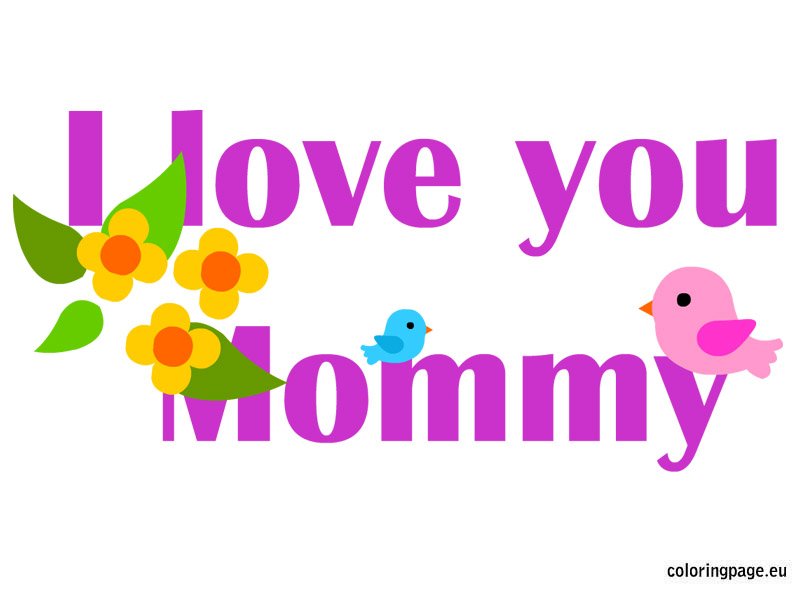There’s nothing quite like the bond between a child and their mother. When we say "I love you Mommy," it’s more than just words—it’s an emotion, a connection, and a lifetime of memories. Whether you’re expressing gratitude, seeking comfort, or simply acknowledging the unconditional love a mother gives, this phrase carries immense weight. It’s a reminder of the person who has been there through thick and thin, shaping who we are today.
From the first time we uttered those magical words as toddlers to the heartfelt messages we send as adults, "I love you Mommy" transcends age and time. It’s a sentiment that connects generations, cultures, and hearts. In this article, we’ll dive deep into why these three little words mean so much and explore the incredible impact mothers have on our lives.
So grab a cup of coffee, settle in, and let’s celebrate the most important woman in your life—the one who wears every hat imaginable and still manages to make you feel like the center of her universe.
Read also:Hair Color Filter The Ultimate Guide To Transforming Your Look Digitally
Table of Contents
- Biography: The Mommy in Every Home
- The Many Roles of a Mommy
- Love Languages: How Moms Show Their Affection
- Why Saying "I Love You Mommy" Matters
- Challenges Faced by Mommys
- Ways to Celebrate Your Mommy
- Mommy Statistics You Should Know
- Cultural Differences in Expressing Love for Mommy
- Tips for Kids to Show Appreciation
- Final Thoughts: Keep Saying "I Love You Mommy"
Biography: The Mommy in Every Home
Let’s take a moment to appreciate the woman behind the title “Mommy.” Whether she’s a stay-at-home mom, working professional, or somewhere in between, every mother brings something unique to the table. Below is a glimpse into what makes mommies so special:
Mommy’s Essential Role
Moms wear many hats—chef, teacher, counselor, chauffeur, and sometimes even therapist. They juggle countless responsibilities while ensuring their kids feel loved and supported. Here’s a quick look at some key aspects of a mommy’s life:
| Name | Role | Responsibilities |
|---|---|---|
| Mommy | Primary Caregiver | Cooking meals, managing schedules, providing emotional support |
| Mommy | Emotional Anchor | Offering comfort during tough times, celebrating successes |
| Mommy | Teacher | Instilling values, teaching life skills |
Every mommy’s journey is different, but the common thread is the love they pour into their families. And that’s why saying "I love you Mommy" can mean the world to them.
The Many Roles of a Mommy
Being a mommy isn’t just one job—it’s a collection of roles that require superhuman strength and patience. Let’s break down some of the hats mommies wear daily:
- Chef Extraordinaire: Who else can whip up pancakes at 7 AM and still manage dinner by 6 PM?
- Chief Encourager: Mommies are the ones cheering you on, whether it’s a big presentation or a little league game.
- Peacekeeper: When siblings argue or tempers flare, mommies step in to restore harmony.
These roles might seem overwhelming, but mommies handle them with grace and determination. Saying "I love you Mommy" is just one way to acknowledge all they do.
Love Languages: How Moms Show Their Affection
Every mommy expresses love differently, and understanding her love language can deepen your connection. Here are the five love languages and how they apply to mommies:
Read also:Phineas And Ferb Opening Lyrics A Dive Into The Catchiest Cartoon Theme Ever
- Words of Affirmation: Some mommies thrive on compliments and verbal appreciation.
- Quality Time: For others, spending uninterrupted time together means everything.
- Receiving Gifts: A small token of gratitude can go a long way for these mommies.
- Acts of Service: Helping out around the house or taking care of errands shows love.
- Physical Touch: Hugs, kisses, and cuddles speak volumes for some.
Understanding your mommy’s love language can help you show her how much you care in ways that truly resonate.
Why Saying "I Love You Mommy" Matters
Those three simple words—"I love you Mommy"—carry so much meaning. They remind mommies of the impact they’ve had on your life and the love they’ve poured into raising you. Research shows that expressing gratitude and affection improves mental health for both the giver and receiver.
According to a study published in the Journal of Positive Psychology, people who regularly express gratitude experience higher levels of happiness and lower stress. So, telling your mommy you love her isn’t just sweet—it’s scientifically beneficial!
Challenges Faced by Mommys
Being a mommy isn’t always easy. From sleepless nights to balancing work and family life, there are plenty of challenges. Here are a few common struggles mommies face:
1. Balancing Responsibilities
Mommies often struggle to find the perfect balance between work, family, and self-care. It’s no wonder they sometimes feel stretched thin.
2. Guilt
Motherhood comes with its fair share of guilt. Whether it’s feeling bad about not spending enough time with kids or questioning parenting decisions, mommies carry a lot of emotional baggage.
By recognizing these challenges, we can better appreciate everything mommies do and offer them the support they deserve.
Ways to Celebrate Your Mommy
There’s no better way to say "I love you Mommy" than by celebrating her on a regular basis. Here are some ideas to make her feel extra special:
- Write her a heartfelt letter expressing your gratitude.
- Plan a surprise outing or dinner date.
- Help out with household chores to give her a break.
- Create a photo album filled with cherished memories.
Celebrating your mommy doesn’t have to be extravagant; it’s the thought that counts. Even a simple hug or text message can brighten her day.
Mommy Statistics You Should Know
Did you know that mothers play a crucial role in shaping the world around us? Here are some fascinating statistics about mommies:
- Approximately 83 million mothers live in the United States alone.
- The average age of first-time mothers globally is 28 years old.
- More than 50% of mothers work outside the home.
These numbers highlight the significant impact mommies have on society and underscore the importance of supporting them in every way possible.
Cultural Differences in Expressing Love for Mommy
How we express love for our mommies varies across cultures. In some societies, verbal expressions of affection are common, while in others, actions speak louder than words. For example:
- In Western cultures, saying "I love you Mommy" is often encouraged from a young age.
- In Asian cultures, showing respect and filial piety through actions may be more prevalent.
Regardless of cultural differences, the sentiment behind "I love you Mommy" remains universal.
Tips for Kids to Show Appreciation
Showing your mommy you love her doesn’t have to be complicated. Here are some practical tips:
- Listen actively when she speaks.
- Offer to help with tasks around the house.
- Send her a thoughtful message or card.
- Spend quality time together doing activities she enjoys.
Small gestures can add up to make a big difference in your mommy’s day.
Final Thoughts: Keep Saying "I Love You Mommy"
As we’ve explored throughout this article, the phrase "I love you Mommy" carries immense significance. It’s a testament to the unbreakable bond between a child and their mother, a bond that lasts a lifetime. Whether you express it through words, actions, or both, make sure your mommy knows how much she means to you.
So, what are you waiting for? Go ahead and tell her "I love you Mommy" today—and every day. And don’t forget to share this article with others who might appreciate the message. After all, spreading love and gratitude benefits everyone!


